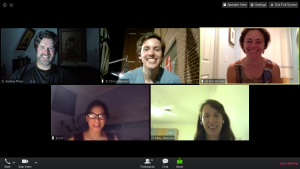
WIT Level One Class Keeps Up the Fun in Quarantine
Quarantine began as WIT’s winter term came to a close, forcing the early end of some classes and some online showcases. One class, a Level One taught by Caroline Howe performed their showcase online. Eager to keep up the magic they felt in the class, members have continued to meet online—continuing the fun, friendship, and levity they experienced in their class.
WIT talked to Erin Brindle, Josh Price, and Chris Gleason about their experience and what they’ve gotten out of doing improv online.
Let’s start with class before everything went online—tell us about your Level One improv experience!
Erin: My Level One Improv class was my first foray in comedy in January 2020. I came with expectations of, “After only 8 weeks, you will be funnier.” Surprisingly, instead, I found the premise of improv was to show up… ‘all-of-you’ in awareness of yourself and others. The awareness piece was an appreciated awakening.
Josh: For me, Level One was a challenge. Every Monday, I’d slog down to CentroNia worried that I wouldn’t be able to come up with anything to say. I’d hold back, and getting into the scene was one of the hardest things I’ve ever had to face. I’d let “the naturals” of the class take the lead, and I’d wrack my brain for something to bring to the table. The first few weeks were, quite frankly, exhausting. But things got better. Caroline was an exceptionally patient and supportive coach. By the end, I’d learned to get out of my head and try to show up. The practice of accepting what the scene and my partners brought to it, started to make the work quite a bit more enjoyable.
Chris: I came to Level One eager to please. A young actor in the area, I graduated from CUA’s musical theatre program last May. Of course I wanted to add improv to my resume, but a lot of my college friends had either moved on or moved away so I also wanted a reliable community of friends. I am grateful that I got both of these things. Our teacher Caroline is so smart and encouraging; she brings out the best in everyone, no matter from what background they come from. I learned a ton and met some really amazing (and funny) people.
 After having your showcase online, the class has continued to play online. What do your practices look like?
After having your showcase online, the class has continued to play online. What do your practices look like?
Erin: Honestly, we skip the warm-ups, which were fun in class. In online, we have a creative writing assignment during the week that ranges from prose to poetry to comedy to music lyrical writing to maintain creative juices. We share our writing. My classmates and I continue to practice 2-to-10 minute scenes. We collaborate—one person tosses out a word to go “from A-to-C.”
Josh: Let me tell you a little secret. I actually kind of like being “locked down” or whatever it is we’re calling it. The chances that I would have found my way to a weekly Zoom practice outside the class if this pandemic and my classmates hadn’t pushed me in this direction are vanishingly small. The practices are play, and a time to connect, and a time to break away from the relative monotony of what’s become “the new normal.”
Chris: They change often, but most sessions we just throw out a word of inspiration, go from A to C with it, and jump right into scenes. It’s casual, but under such different circumstances it’s nice to know that we’re keeping up with what we’ve learned. We sometimes discuss our reactions during or at the end of the meeting to keep refining. We also explore other creative outlets, like writing lyrics. Last time we played with storytelling! It’s mostly just about showing up every week.
What’s fun about doing improv online, when it’s so much different than doing it in person?
Erin: Improv online challenges us to communicate creatively. It’s the next frontier, perhaps, in comedy. While we can’t be near one another, we faux-create the sensory stimulation of the world of the scene we have created. We become the lady waiting for the bus still steaming from a conflict with her son that morning.
In scenes during COVID-quarantine, I can express my own experience through my characters, the person who wears masks absolutely everywhere, given voice to the actual virus, and personification of the anxiety of waiting. The comedy is a release valve for the everyday experiences and the associated feelings like walking on a crowded city block, entering the grocery store after a long wait outside, and getting off your last Zoom call of the day.
Josh: For me, the online format is freeing. There’s less object work, less mental energy expended on getting the stage presence right, and because I know I’m really alone in my room and my classmates can see me in a way that’s filtered by the online medium, I’m less self conscious. I can respond rather than react. My first online improv (or “improve” as Erin would say) was a challenge because it was new, but now, the medium is giving me the freedom to explore things in a way that I think would have taken longer to develop in a live environment. Here’s hoping that sense of freedom carries forward.
Chris: It’s still very new to us I think. We definitely have some moments of confusion when we aren’t all on the exact same page, which can be quite funny. When that happens we just talk it out. It’s a lot less pressure, because it’s strange for everyone. We’re all discovering together.
Are there any fun advantages to doing improv online that surprised you?
Josh: As I described earlier, I was really surprised by the sense of freedom to “be” that the online medium provided. I was not seeing that coming, and I’m grateful I got the chance to experience it. I believe it will have a positive impact on my play going forward….even when we return to a more traditional format.
Chris: Yes! For example, one time Erin and I were doing a scene where she was coaxing me outside into a thunderstorm. I fell out of character a bit because I couldn’t actually go and stand next to her. LOL. But that forced me to come up with a different solution that I would never have thought of otherwise. I think I ended up yelling at her for trying to kill me. So I think that’s what I like best about online improv—there are obstacles that actually force you to be more creative.
What have you personally gotten out of keeping this group going?
Erin: After months of practice, I still have to show up for the scene. I love that no amount of preparation can be completed for a particular scene, except to curiously engage and be ready for the thing you can not imagine happening.
I love my teacher, Caro, and her enthusiasm for the Art and Sport of Improv. I love that she encouraged us to keep on going. In our online version of the class, I feel more comfortable extending the reach of possibility to allow “flopping,” not needing to continually bolster my ego.
Josh: The practice between formal classes has been invaluable in honing my comfort with play. That said, the ongoing connection with my classmates during our weekly practices has by far been the most fulfilling aspect of the practice.
Chris: It’s an opportunity to be creative! And I love seeing my friends every week. They are hilarious and smart, and they bring out the best in me.